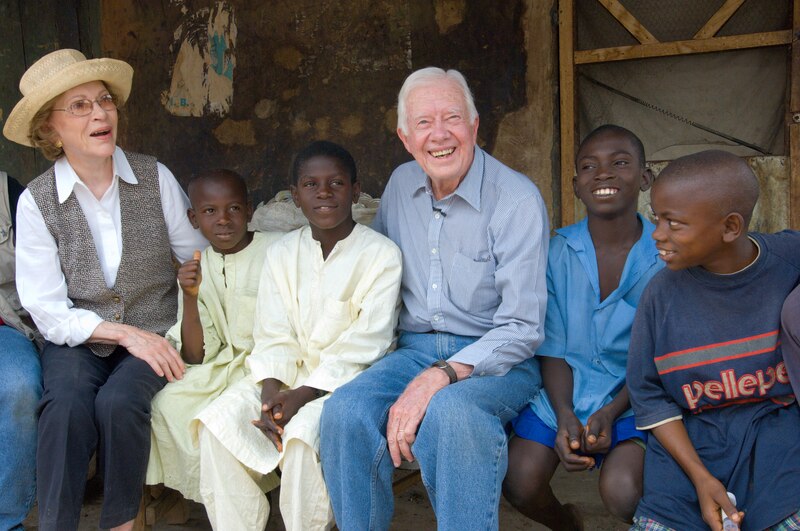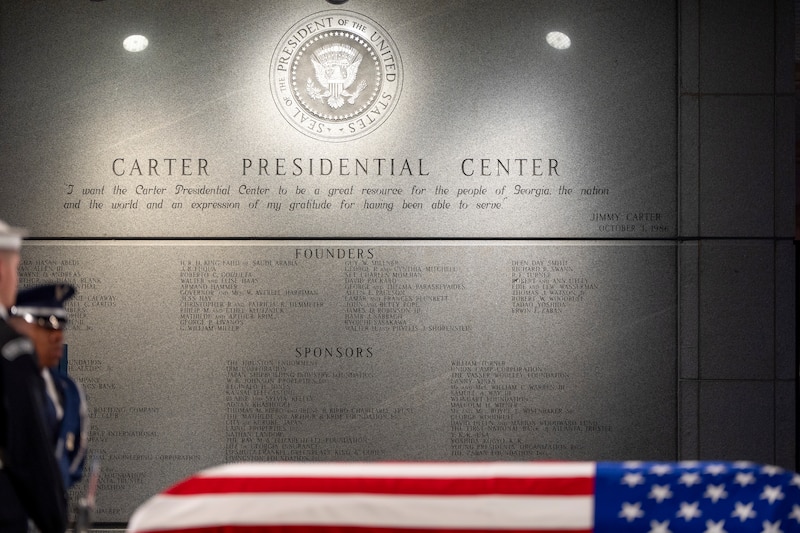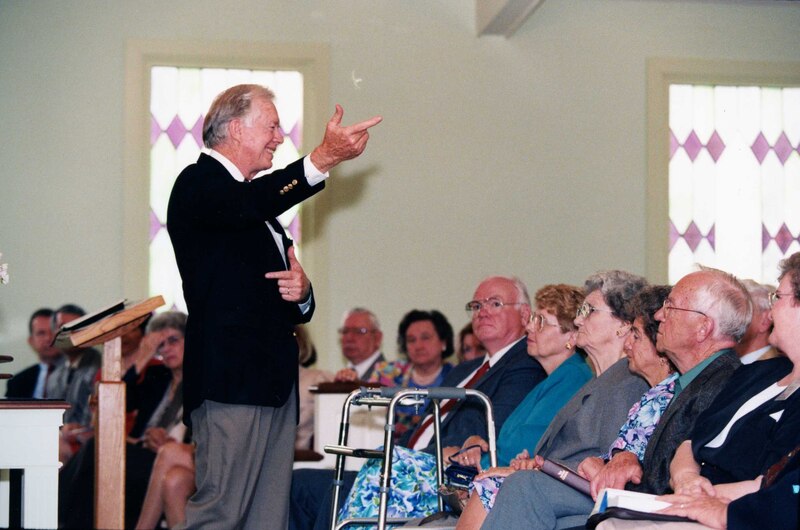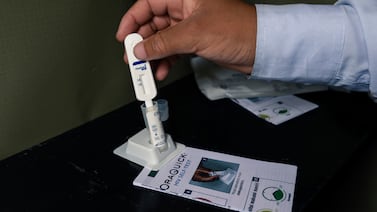Public health, explained: Sign up to receive Healthbeat’s free Atlanta newsletter here.
Former President Jimmy Carter’s public health legacy – at home and abroad – was driven by empathy and an enduring faith in people and science.
Those achievements are well-known: Fighting Guinea worm disease, a parasitic illness that once affected more than 3 million people but in 2023 affected just 14. Battling devastating tropical diseases like malaria and river blindness around the world. And with his wife, Rosalynn Carter, carving out space for people to talk openly about mental illness in the United States.
His approach shows how listening, building trust, and showing empathy can achieve big improvements in public health – and how faith and science need not be divided.
Jimmy Carter believed “that science is part of God’s gift, and they’re not in opposition,” said Atlanta City Council President Doug Shipman, who is a member of The Carter Center board.
“His faith was one of theology, but it was also one of action. And so science, conflict resolution, peace building, those are all acts of almost civic faith, but they were rooted in his religious faith.”
As the former president is honored with memorial services in Georgia and Washington this week after his death Dec. 29 at age 100, Shipman and others who worked closely with the Carters in Atlanta share five key lessons from his public health legacy.
1. ‘Walk a mile in somebody else’s shoes’: Public health is personal.
Jimmy Carter built trust with people by focusing on personal relationships. Empathy was a byword for him, and that paid off in his organization’s success in combating neglected tropical diseases.
“He really had an empathy, and I call it an obligation … to be open. It’s like the old thing of, ‘Walk a mile in somebody else’s shoes,’” said Jim Brasher, who served as special assistant to President Carter and chief development officer at The Carter Center from 1987 to 1996, among other roles.
Founded in 1982 in Atlanta, the year after Carter left the White House, The Carter Center is a nongovernmental organization that seeks to prevent conflicts, build peace and democracy, and improve public health in countries around the world.
“He really had the capacity, and she did too, of being able to put themselves in the position of the people that they were working with,” Brasher said.

That approach helped the president achieve a historic peace settlement between Egypt and Israel at the 1978 Camp David negotiations. But it also helped him in combating diseases like Guinea worm and river blindness in societies that were very different from America.
“You listen and you observe and you learn and you empathize,” Brasher said of Carter’s approach. “That was the thing that allowed him to do the work that he did.”
Dr. Kashef Ijaz, vice president for health programs at The Carter Center, shared a story about Carter’s visit to Ethiopia to meet then-health minister Tedros Adhanom Ghebreyesus, who is now director-general of the World Health Organization.
While Carter had come to talk about another program, Tedros said his country needed help with malaria. That encounter led The Carter Center to support a malaria control program beginning in 2007, Ijaz said.
Carter played the long game when it came to relationships, Shipman said.
“When he would go and meet with leaders or philanthropy, he would also meet with their children as they became older,” Shipman said. “Often he would say, ‘So-and-so is now in charge of this country, but I knew their father, and I actually met them when they were 14.’
“He built relationships before they were transactional,” Shipman said.
2. ‘The people at the end of the road’: Public health is local.
That focus on relationships extended throughout The Carter Center’s programs, down to the most local level, where public health victories were won person by person and village by village.
“He understood that for any program to work, it had to be through the people on the ground taking care of their own health and taking care of their neighbors’ health, as opposed to having some government come in and say, ‘You will do this,’” said Dr. John Hardman, who served as president and CEO of The Carter Center for more than 20 years.
That required a willingness to put aside credit for The Carter Center in favor of bolstering local leaders. Programs were named, for example, “the Ethiopia Public Health Training Initiative,” rather than labeled with The Carter Center moniker, Hardman said.
“We hired local people, and we made it their program and their ownership from the very beginning, so that they were responsible,” Hardman said. “So many organizations at the time were sending expats over” to tell local people what to do.
“We would always go into a country saying, ‘What are your critical needs? How would you like to do it?’” Hardman said. “We wanted them to do it because that was the only way we saw that it was going to be successful.”
“We didn’t have to own it,” Brasher said.
Carter’s emphasis on engaging communities and individuals was especially important when it came to the Guinea worm disease eradication effort. There is no vaccine or medicine, so eradication can only be achieved through behavioral changes, Ijaz said.
“It’s all about community engagement … working with the people at the end of the road and health education, treating the sources of water …. This is done through hundreds and thousands of volunteers from the villages who provide health education to hundreds of villages,” Ijaz explained. “That is what President Carter taught.”
Those who worked with Carter saw parallels in his own upbringing in Plains, Ga.
“When you live in a small town like that, you not only profit from having a business in the town, but you have a tremendous obligation to take care of the people who are your customers,” said Brasher, who also grew up in a small town.
Brasher and others noted that Carter spent much of his early life playing with Black children in an era of intense racial segregation. He also watched his mother, “Miss Lillian” Carter, minister to the community as a nurse.
“The fact that his mother was someone who could be awakened at any time, any day by someone who had a need for her services … that really set in,” Brasher said.
The Carter Center’s public health approach was “built around the social entrepreneurship of making each person in that community feel like they were important,” said Ben Johnson, a longtime center board member.

3. ‘The Guinea Worm ceasefire’: Public health can help build peace.
Peace is key to public health, Carter believed.
“If a country is in chaos and doesn’t have a government and is [in] civil war. … It’s very difficult for The Carter Center to carry out its peace programs, which are very much on the ground and hands-on,” Johnson said. “You need the stability to get to the health care issues.”
But public health can help “wage peace,” in the words of the center’s motto.
Initial efforts to improve agriculture and public health proved to political leaders in conflict-ridden societies that Carter was deeply committed to the well-being of their people and gave him a doorway into peace talks.
Take, for example, “the Guinea Worm ceasefire” in Sudan in 1995.
“‘Are you willing to go the conference table and deal with the fighting, the conflicts?’” The Carter Center asked warring leaders, Hardman said. The goal was to get health workers to areas made inaccessible by fighting.
The answer was “yes,” prompting a six-month ceasefire that allowed health workers to implement Guinea worm disease eradication efforts and distribute childhood immunizations.
“That led to being able to deal with more of the conflict resolution and the political issues because of the relationship that we built through health programs … that allowed us to show our interest in the people,” Hardman said.
4. ‘Science is part of God’s gift’: Faith and science go together.
Carter was known for his deep Christian faith. He was a longtime member of Maranatha Baptist Church, where he taught Sunday school, and many of his 32 books focused on his Christianity.
Rather than seeing faith and science as opposed, he saw them as complementary, and his faith drove his public health work.
“I don’t think President Carter ever saw any fight between science and his spiritual health,” Johnson said. “His religious faith was dealing with the human issues and dealing with the environment.”
His faith drove his interest in improving people’s lives around the world.
“He wasn’t one that quoted Bible verses, but you could literally see that what he was doing was following the teachings of Jesus Christ,” Brasher said. “It was something that was demanded of him as a person. It was about responding to the need.”

5. ‘How do you listen to people?‘: Mental health matters.
While much of Carter’s post-presidency work focused on international issues, he and Rosalynn Carter, who died in November 2023, continued to work to de-stigmatize mental illness in the United States and get insurers to cover treatment.
They were inspired to take on that challenge early in his political career, spurred by one of Rosalynn Carter’s encounters on the campaign trail while he was running for Georgia governor.
Hardman shared the story of a woman who worked at a mill asking Rosalynn Carter how her husband planned to address mental health issues. The woman and her husband could not find good care for their daughter, putting a strain on the family.
Rosalynn immediately went to Jimmy and asked what his plans were. He told her he did not know for certain but that he wanted her to lead the charge to find solutions, Hardman said.
That experience listening to ordinary peoples’ struggles and finding ways to help was a thread throughout the Carters’ lives together, Johnson said.
“That’s the message … How do you listen to people?” he said. In this case, it led to a lifelong commitment to improving mental health care.
While Jimmy Carter served as governor, his wife served on a commission focused on helping Georgians with mental illness and developmental disabilities. That commission produced a 1971 report called “Helping Troubled Georgians Solve Their Problems.”
Rosalynn Carter went on to become a national leader in mental health, serving as honorary chair of the President’s Commission on Mental Health during her husband’s presidency.
She was particularly committed to ending stigma by openly talking about mental illness and encouraging others to do so as well, as with her 1998 book “Helping Someone With Mental Illness.” Rosalynn also twice traveled to Hollywood to urge entertainment leaders to find less negative ways to portray mental health issues.
The Carter Center’s mental health work includes advocacy at the state and federal level to develop and enforce laws that require insurers to cover mental health treatments on par with how they cover physical illnesses.
In Georgia, The Carter Center leads the Georgia Parity Collaborative, a broad coalition that pushed the state legislature to adopt a mental health parity law in 2022.
The center’s mental health programs also advocate for improved access to school-based mental health services and care for older adults, among other projects.
Ijaz said the center will continue to extend its international mental health work in a “cross cutting way” with other Center health programs, like those helping people struggling with the stigma of diseases like lymphatic filariasis and tuberculosis.
Rebecca Grapevine is a reporter covering public health in Atlanta for Healthbeat. Contact Rebecca at rgrapevine@healthbeat.org.







